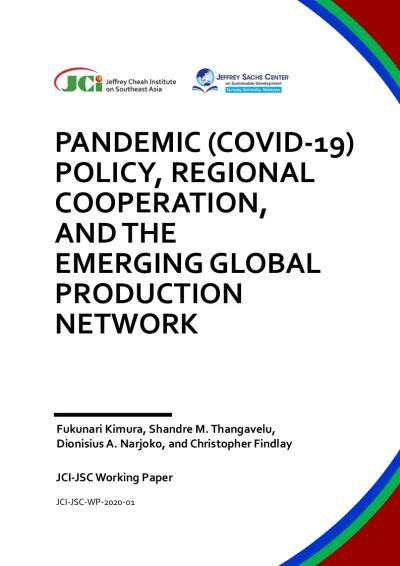
JCI-JSC-WP-2020-01: Pandemic (COVID-19) Policy, Regional Cooperation, and the Emerging Global Production Network
Publication date: April 2020 | Length of paper: 28 pages | ISBN: TBC
In this paper, we explore the possible policy responses to the pandemic shock as well as the related economic (financial crisis) shocks on trade and global value chains (GVCs) in East Asia. We find that regional policy coordination is critical to mitigate and isolate the pandemic shock. It is important to identify the pandemic
events early to flatten the pandemic curve at the national and regional level. This supports a recent study by the World Bank (2020) which highlights the importance of early mitigation policies during the pandemic shock.
The cost of the pandemic and economic shocks increases significantly when several countries in the region experience the systemic pandemic shock concurrently. In this case, flattening the regional pandemic curve becomes important. The results also indicate the need for greater coordination in East Asia to mitigate the pending economic shock in terms of unemployment, corporate bankruptcy, and financial market fragility.
The paper also highlights that the stability of the GVC network is critical during the pandemic in terms of hedging the risk of disruptions to the procurement of critical medical and health products as well as the stability of the services linkages to manufacturing, such as the logistics sector. Regional policy coordination and the stability of GVCs are valuable in the post-pandemic recovery of the region.
Download
Author(s)
Fukunari Kimura
Dionisius A. Narjoko
Christopher Findlay
The JCI-JSC Working Paper series is published to disseminate preliminary research findings and stimulate intellectual discourse on wide-ranging public policy issues, ranging from security to sustainability. The views expressed herein are those of the author(s) and do not necessarily reflect the views of the Jeffrey Cheah Institute on Southeast Asia and the Jeffrey Sachs Center on Sustainable Development.



